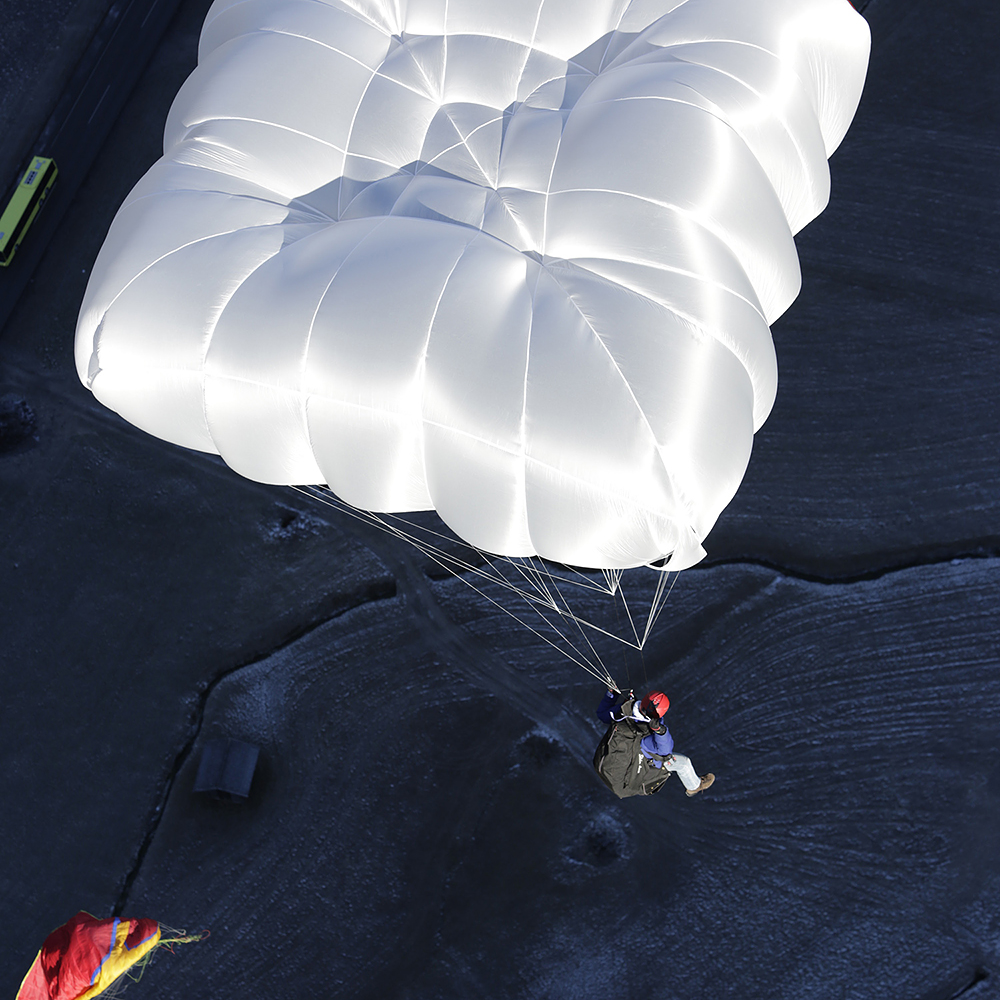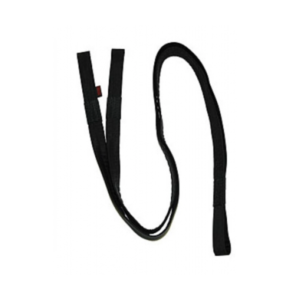Description
- Just like conventional cross canopies, the TARGETcross after opening initially enters a stall with vertical sinking. This reliably prevents a downplane position of the reserve.
- The S-shaped profile of the TARGETcross canopy provides a high righting moment and ensures that the paraglider is quickly unloaded and dives down. This prevents the risk of a stable shear position between the reserve and the paraglider, facilitates pulling in the paraglider and even allows the unhooking of one riser with Pinlock or conventional carabiners.
- Due to different line lengths, the base of the TARGETcross is fanned out in a zigzag pattern. This significantly accelerates the air intake into the canopy. However, it is associated with a substantially higher production effort.
- Effective reduction of the risk of of entanglements with the main glider: The lines of the TARGETcross are made longer, so that the canopy opens approximately in the radius of the main glider and not within reach of the paraglider lines.
- Soft Dyneema line material enables steering even with multiple twists.
- The inner container has been developed on the G-Force Trainer and features an extra compartment for the lines; it is available for both integrated and front containers.
- The ultra-fine woven and waterproof finished fabric allows minimal weight and packing volume with sufficient robustness.
- Although the packing method of the TARGETcross is slightly different from that of a conventional cross canopy, it does not involve more effort.
| Modell | TARGETcross ST light 100 | TARGETcross ST light 125 | TARGETcross ST light 160 | TARGETcross 160 ST Tandem | TARGETcross 220 ST Tandem |
| Max. / Min. load: | 100 / 50 kg | 125 / 60 kg | 160 / 80 kg | 160 / 80 kg | 220 / 100 kg |
| Flat surface: | 25,2 m² | 30,7 m² | 41,0 m² | 41,0 m² | 59,2 m² |
| Weight : | 1170 g | 1390 g | 1780 g | 1850 g | 2570 g |
| Sink speed: | 4,6 m/s @ 100 kg 3,6 m/s @ 70 kg | 4,5 m/s @ 125 kg 3,5 m/s @ 85 kg | 4,8 m/s @ 160 kg 3,5 m/s @ 110 kg | 4,8 m/s @ 160 kg 3,5 m/s @ 110 kg | 4,6 m/s @ 220 kg 3,6 m/s @ 160 kg |
| Volumetric value: | 3900 ccm | 4700 ccm | 5300 ccm | 5300 ccm | 7300 ccm |
| Cerfification: | EN, LTF | EN, LTF | EN, LTF | EN, LTF | EN, LTF |
| Article number: | HFa195/100 | HFa195/125 | HFa195/160 | HFa195/160T | HFa195/220 |
The diagonal configuration and S-shaped canopy trim of the TARGETcross with longer lines at the rear edge cre- ate a high righting moment which prevents a downplane of the canopy and ensures that the main glider is imme- diately unloaded. Pre-braking of the rescue parachute is therefore not necessary with the TARGETcross. The re- sult is an immediate forward movement which keeps the paraglider at a distance from the reserve. The Basic and HG versions of the TARGETcross also feature this trim, as the advantages of this configuration clearly outweigh the disadvantages. FAQDo I have to disconnect my glider when opening the TARGETcross? No. Although if the pilot reacts in a passive way, the TARGETcross works perfectly. The risk of a side slip is very low for a TARGETcross. Nevertheless, the glider should be disconnected – if possible – from all rescue systems, no matter whether they are steerable or not. The disconnection can be made by separating the glider from the carabiner, as in this case, an automatic separation system for the speed system is absolutely essential. Further opportunities are rapid separation carabiners or cutting off the main lines by means of a jack knife. As you can’t make general statements about how the glider reacts after rescue deployment and every rescue system is always influenced by the residual resistance of the glider, a complete disconnection of the glider can only be an advantage – also if a disconnection is not absolutely necessary for the TARGETcross.
| |||||||||||||||||||||









Reviews
There are no reviews yet.